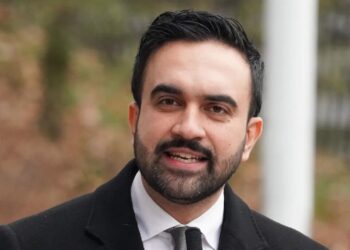
In the age of MAGA, ideological lines that once distinguished left from right have blurred. Republicans who said they were willing to die for the market now support a president who tells the government to buy up shares in the private sector. (Bernie Sanders approves.) The right has also embraced cancel culture, a progressive trend it recently despised. But conservatives aren’t the only ones emulating the other side.
In perhaps the most striking reversal of this era, progressives are now the ones who tend to speak like moralists. America is long past the days of the Christian right’s Moral Majority and the “good versus evil” wars of George W. Bush’s administration. An emerging form of progressive rhetoric is taking their place. Consider the left’s appropriation of the term moral clarity. In April, during her first major speech since Donald Trump returned to the White House, Kamala Harris praised Representative Alexandria Ocasio-Cortez and other Democrats for “speaking with moral clarity about this moment.” As AOC herself said in 2018, “There is nothing radical about moral clarity”—a phrase that still endures on T-shirts. In The Message, a 2024 essay collection by Ta-Nehisi Coates, the progressive writer recalls encouraging his students at Howard University to employ overtly moral language. “There has to be something in you,” he told them, “something that hungers for clarity.”
When people describe the world by appealing to black-and-white morality, they tend to reveal more about themselves than anything else. For many, such language suggests that they hold their own views to be unimpeachable and the other side’s to be irredeemable. But moral clarity, like beauty, is perishable and—at least in practice—subjective. Many of the protesters who assaulted police officers in the summer of 2020, for example, did so with the same ethical certitude as those who stormed the Capitol in January 2021. Both groups believed they were redressing an injustice—one racial, one electoral—that too many others wouldn’t acknowledge. Both groups evinced a kind of moralism that blinded rather than clarified, eliminating the possibility of persuasion, compromise, or open debate.
[Thomas Chatterton Williams: To see how America unraveled, go back five years]
At first glance, the left’s appeals to moral clarity might not seem controversial. To interpret reality through a moral lens is necessary and admirable, and insisting on nuance can seem obtuse when large swaths of the right have championed cruel prejudice and self-serving authoritarianism. But the left will need to reform itself in order to confront these forces. (Don’t let a few recent Democratic victories fool you.) And that will require precisely the kind of introspection and self-criticism that moralism precludes. In this sense, urging moral clarity can really be an obstacle to insight.
The left’s embrace of this language has been a years-long process. In 2020, at the height of the social-justice movement spawned by George Floyd’s killing, the investigative reporter Wesley Lowery exhorted journalists to describe the world with “moral clarity.” “Neutral objectivity trips over itself to find ways to avoid telling the truth,” Lowery wrote in The New York Times. “Moral clarity,” by contrast, demands “that politicians who traffic in racist stereotypes and tropes—however cleverly—be labeled such with clear language and unburied evidence.”
Lowery was responding, in part, to a Times essay by Republican Senator Tom Cotton, which argued that the rioting and looting in cities that summer required a military response. Polling showed that many Americans—perhaps most—supported Cotton’s view. Nonetheless, a chorus of progressives had deemed the op-ed racist and even life-threatening, prompting the ouster of James Bennet, one of the paper’s top editors. After Bennet’s departure, Lowery suggested that the decision to publish Cotton was not merely flawed but morally obscene. (Earlier this year, the Columbia Journalism Review reported the accounts of several women who say Lowery sexually assaulted them. Lowery said in a statement to CJR that its story was “incomplete and includes false insinuations,” but that he “should have better upheld boundaries.”)
In the years since Lowery’s call for clarity, a divide has emerged on the left over the correct moral response to Trump’s political dominance. On one side are the idealists who prioritize righteousness, even when it spells their own defeat. On the other are the pragmatists who prioritize broadening their coalition, even when it entails trade-offs.
A recent exchange between Coates and the New York Times journalist Ezra Klein, two of the most prominent voices on the left, symbolized the split. One day after the assassination of the MAGA activist Charlie Kirk, Klein published a column praising him for “practicing politics in exactly the right way” and calling him “one of the era’s most effective practitioners of persuasion.” Klein vehemently disagreed with Kirk’s agenda but nonetheless concluded, “Liberalism could use more of his moxie and fearlessness.”
These statements provoked an outpouring of opprobrium. What are we to make “of the writers, the thinkers, and the pundits who cannot separate the great crime of Kirk’s death from the malignancy of his public life?” Coates asked in Vanity Fair. “Can they truly be so ignorant to the words of a man they have so rushed to memorialize?” Coates noted that intolerance and cruelty were regular features of Kirk’s activism, and he assembled a litany of quotes to prove it.
[George Packer: The tragedy of Charlie Kirk’s killing]
Klein invited Coates on his podcast and explained his decision to write about Kirk, to which Coates responded: “Was silence not an option?” Coates seemed to suggest that saying nothing at all was better than describing the other side as anything but malicious—an inversion of the proverbial wisdom about not having anything nice to say. Later in the conversation, Klein illustrated the problem with such an approach. “I look at the last eight, 12 years, and what I see having happened is we—the coalition I am in, the things I believe in—lost ground,” he said. “We’ve stopped doing politics. We’ve written a lot of people off, and in writing them off, we are losing, and we are unable to protect ourselves, unable to protect them, and just unable to make good change in the world.”
From a certain perspective, Klein was simply pointing out the obvious: Ideological purity won’t do you any good if it prevents you from building a coalition large enough to win power and put your ideology into practice. For Coates, however, that view gets things backwards. What good is the power to govern, he asks, if you’ve rendered yourself impure to win it? “I’m all for unifying, I’m all for bridging gaps, but not at the expense of my neighbor’s humanity,” Coates said. “I am at war with certain ideologies and ideas, and I want them expunged.”
Whereas Coates spoke of a metaphorical war, the right has for decades demanded “moral clarity” in response to literal armed conflict. This began long before the term became a rallying cry for progressives, as the journalist Geoff Shullenberger has pointed out. In 2002, the Republican commentator William Bennett helped popularize the phrase in his defense of Bush’s disastrous foreign policy, Why We Fight: Moral Clarity and the War on Terrorism. More recently, in the context of the war in Gaza, conservatives have used appeals to anti-Semitism as a pretext to clamp down on universities, a campaign that the right has described in militaristic terms. In both contexts, moralized rhetoric granted conservative projects an almost undeniable rationale: Who could oppose fighting terrorism or fighting bigotry against Jews?
In 1961, the psychiatrist Robert Jay Lifton identified a series of what he called “thought-terminating clichés”—phrases that are used to dismiss any examination of ambiguity. (Think: “Let’s agree to disagree.”) These platitudes are “the start and finish of any ideological analysis,” Clifton wrote; people resort to such “language of non-thought” when they want to smooth over cognitive dissonance and eschew intellectual discomfort. Moral clarity now belongs on that list. Invoking the phrase stifles dissent and critical thinking. It either ends debates prematurely or makes them, in Shullenberger’s words, “interminable and unproductive.”
Still, to give up entirely on the ideal of moral clarity is to succumb to nihilism. Societies need a baseline moral consensus in order to reject the beliefs and behaviors that violate their shared norms. In her astute 2008 book, Moral Clarity: A Guide for Grown-Up Idealists, the philosopher Susan Neiman points out that failing to find any moral clarity can lead people to “settle for the far more dangerous simplicity, or purity, instead.”
The question of moral purity has taken on specific electoral stakes for the left thanks to a pair of recent controversies involving Graham Platner, a former Marine running in Maine’s Democratic Senate primary. Last month, deleted Reddit posts were discovered in which Platner endorsed political violence and called himself “a communist.” Soon after, a video surfaced showing Platner with a tattoo of the Totenkopf, a symbol worn by members of the SS who presided over concentration camps. Platner has apologized for many of his posts, denied accusations that he’s a Nazi, and said he didn’t know about the symbol’s affiliation when he got the tattoo, which he’s since covered up with another one.
[Read: How ‘big tent’ are Democrats willing to go?]
Many Democrats called for Platner to resign despite his substantial lead in polling from before the scandals. (A more recent survey suggests that the controversies would hurt his chances in the general election.) But Bernie Sanders stood by his earlier endorsement: “There might be one or two more important issues,” he said. A number of influential left-wing voices echoed the senator. “Censorious, hall monitor liberalism that refuses to accept growth in people,” the progressive commentator Emma Vigeland wrote on X, “is far more of a threat to the Democratic Party’s chances in the future than anything dug up on Graham Platner.”
Of course, “no Nazi tattoos” and “don’t advocate political violence” are not particularly lofty ethical bars to clear; no one should be dismissed as a snowflake for finding such transgressions disqualifying. But the fact that many on the left seem willing to extend Platner the opportunity to redeem his mistakes is a promising sign. It is grounded in the recognition that Democrats’ long-term moral interests are moot if they can’t win elections.
The alternative—rigid sanctimoniousness that cannot allow the possibility of forgiveness or negotiation—is not clarity. It’s dogmatism.
The post The Problem With ‘Moral Clarity’ appeared first on The Atlantic.




